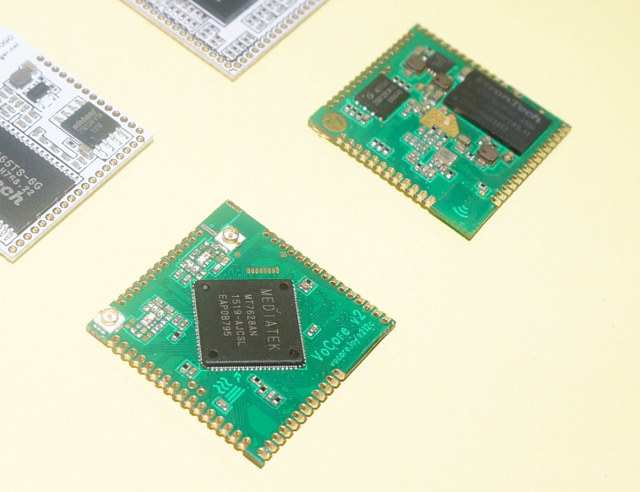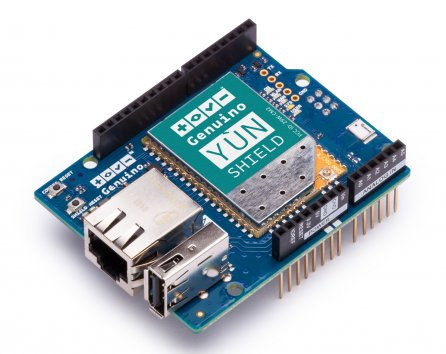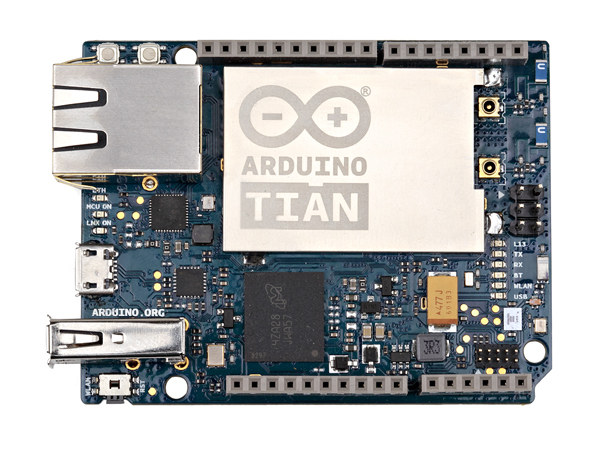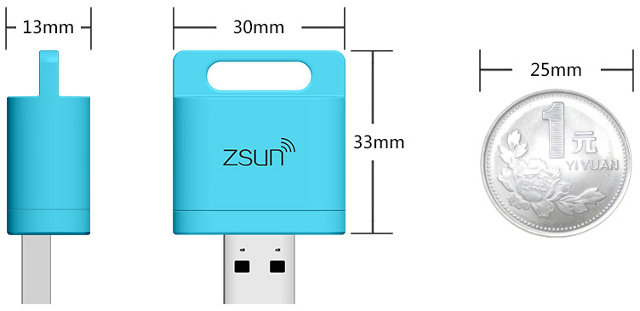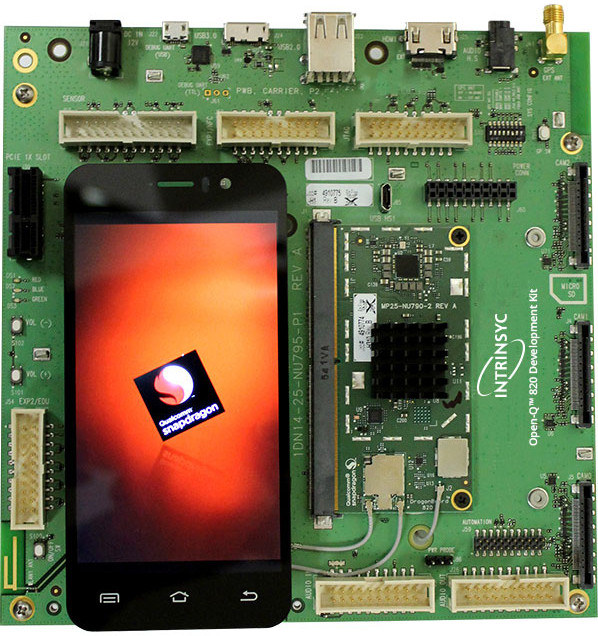When Vocore WiFi module launched in 2014 on Indiegogo, it quickly became popular as at the time it was hard to find cost effective and small WiFi modules with GPIOs, and its compact Ethernet dock solution was also a hit. The developer has now been working on VoCore2 for several months, and recently announced a beta testing program. Vocore2 preliminary specifications: SoC – Mediatek MT7628AN MIPS processor @ 580 MHz System Memory – 64 or 128 MB DDR2 Storage – 16MB NOR FLASH, 1x SDXC via I/O pins Connectivity – WiFi 802.11n 2T2R up to 300 Mbps with either 2 u.FL connector or 1 u.FL connector + on-board chip antenna (Max signal output >19.5dbm peak); 2x 10/100M Ethernet interfaces via I/O pins I/Os – About 30 GPIOs multiplexed with 3x UARTs, 1x I2C, 1x I2S, 1x reference clock, 1x USB 2.0, 1x PCIe 1.1, 1x high speed SPI (40Mbps max), […]
Arduino Yún Shield Adds Ethernet and WiFi to Arduino Boards for $50
You can now add WiFi to Arduino for about $3 thanks to ESP8266, and it’s been long possible to add Ethernet with ENC28J60 module now selling for the same $3. Alternatively, if you want some a little more powerful, you could also use IoT modules running OpenWrt such as a $30 WrtNode or $13 LinkIt Smart 7688 both capable of supporting Ethernet with some hacks. But if you’ve been used to Arduino Yun, have a few spare Arduino boards, or simply think the other solutions are just too cheap, Arduino LLC has just launched Arduino/Genuino Yún Shield for $49.90 / 43.90 Euros. Arduino Yún Shield specifications: SoC – Qualcomm Atheros AR9331 MIPS WiSoC @ 400 MHz System Memory – 64 MB DDR2 Storage – 16 MB flash Connectivity – 10/100 M and 802.11 b/g/n WiFi USB – 1x USB 2.0 host port Board interfacing – SPI and HW Serial Misc […]
Linux 4.5 Released – Main Changes, ARM and MIPS Architectures
Linus Torvalds released Linux Kernel 4.5 on Sunday: So this is later on a Sunday than my usual schedule, because I just couldn’t make up my mind whether I should do another rc8 or not, and kept just waffling about it. In the end, I obviously decided not to,but it could have gone either way. We did have one nasty regression that got fixed yesterday, and the networking pull early in the week was larger than I would have wished for. But the block layer should be all good now, and David went through all his networking commits an extra time just to make me feel comfy about it, so in the end I didn’t see any point to making the release cycle any longer than usual. And on the whole, everything here is pretty small. The diffstat looks a bit larger for an xfs fix, because that fix has […]
Arduino Tian Board Combines Atmel D21 MCU, Atheros AR9342 WiSoC, and CSR8510 Bluetooth 4.0 SoC
Arduino Tian is an update of Arduino Yun board, mainly replacing Atmel ATMega32u4 8-bit MCU and Atheros AR9331 WiSoC with more recent Atmel SAMD21 32-bit Cortex M0 MCU and Atheros AR9342 WiSoC with support for dual band 802.11 b/g/n WiFi, as well as CSR8510 Bluetooth 4.0 SoC. Arduino Tian specifications: MCU part MCU – Atmel SAMD21G18 ARM Cortex-M0 MCU @ 48 MHz with 256KB flash and 32KB SRAM Digital I/O Pins – 20x GPIOs with 12x PWM and UART Analog Input Pins – 6x 12-bit ADC channels Analog Output Pins – 1x 10-bit DAC DC Current per I/0 – 7mA Operating Voltage – 3.3V “Linux” SoC part SoC – Atheros AR9342 MIPS74Kc processor @ 535 MHz System Memory 64MB DDR2 Storage – 16 MB Flash for firmware, 4 GB eMMC Flash for data Connectivity – 10/100M Ethernet, dual band 802.11n 2×2 2.4/5 GHz WiFi, Bluetooth 4.0 + EDR (CSR8510) USB […]
Zsun Wifi Card Reader Can Now Run OpenWrt
Zsun Wifi card reader is a tiny micro SD card reader with WiFi connectivity, and while people managed to access the device serial console a few months ago, the plan was to eventually run OpenWrt since it’s based on the popular Atheros AR9331 WiSoC combined with 64MB RAM and 16MB SPI Flash. It would also be one the smallest OpenWrt capable device with dimensions of 30 x 33 mm. A team of Polish managed this feat, and have now posted instructions to install OpenWrt, as well as other documentation, for example a description of the board’s GPIOs. There are four methods to flash OpenWrt: Solder on an Ethernet jack and flash from the original uboot (hard but safe) Reflash the bootloader from the original firmware to one that supports upload over serial (less soldering but fatal if you mess up) Reflash the firmware from the original firmware using mtd_write (easy […]
Intrinsyc Introduces Qualcomm Snapdragon 820 Cortex-A72-Class Development Board, SoM and MDPs
While there’s already an healthy choice of ARMv8 development board such as LeMaker Hikey, or Qualcomm DragonBoard 410c, all those platforms are based on the lower end Cortex A53 64-bit ARM core, and ARM Cortex A57, let alone Cortex A72, boards are much more difficult to find, as they are much pricier and/or have limited availability. Intrinsyc may have released the first (somewhat) affordable and accessible Cortex-A72-class development board with Open-Q 820 development kit comprised of a SoM and a baseboard, as well as smartphone and tablet mobile development platforms (MDPs) based on Qualcomm Snapdragon 820 quad core Kryo processor. While Kryo is a custom ARMv8 designed by Qualcomm, and not exactly a Cortex A72 core, both have similar performance, as shown in Snapdragon 820 Antutu and Kirin 950 Antutu results. Open-Q 820 board specifications: SoC – Qualcomm Snapdragon 820 quad core Kryo cores with 2x cores @ up to […]
Linux 4.3 Release – Main Changes, ARM and MIPS Architectures
Linus Torvalds released Linux Kernel 4.3 last week-end: So it *felt* like the last week of the rc series was busy, to the point where I got a bit worried about the release. But doing the actual numbers shows that that really was just my subjective feeling, probably due to the kernel summit and travel back home from Korea. It wasn’t actually a particularly busy week, it’s just that the pull requests were more noticeable in the last couple of days. We had a network update and a late fix for a x86 vm86 mode bug introduced by the vm86 cleanups, but other than that it’s just a collection of various small one-liners all over. Ok, the vm86 mode thing was a one-liner too, it was just slightly more nerve-wracking because it looked scarier than it was before people (Andy) figured out what was going on. The changes from rc7 […]
Google OnHub 802.11ac WiFi Router Also Supports Bluetooth 4.0, Zigbee/Thread, and Automatic Firmware Upgrades
Google has just announced OnHub, a $200 router designed in cooperation with TP-Link which the company claims will be “fast, secure, and easy to use”. It should indeed be fast as it’s a Class AC1900 router capable of 600 Mbps with 802.11n and 1300 Mbps with 802.11ac. Router are gateways between home networks and the Internet, but most of them aren’t updated automatically, leaving them vulnerable to attacks, while OnHub should get its firmware regularly updated over-the-air and include a Trusted Platform Module (TPM), making it more secure. Finally, Android and iOS apps are available to easily manage the router. OnHub (TGR1900) router specifications: WiSoC – Qualcomm Atheros IPQ8064 dual core Krait processor @ 1.4 GHz System Memory – 1GB DDR3L Storage – 4GB eMMC, 8MB NOR flash Connectivity 802.11 b/g/n 3×3 with smart antenna 802.11 a/n/ac 3×3 with smart antenna AUX wireless (802.11 a/b/g/n/ac 1×1) – I don’t understand […]


